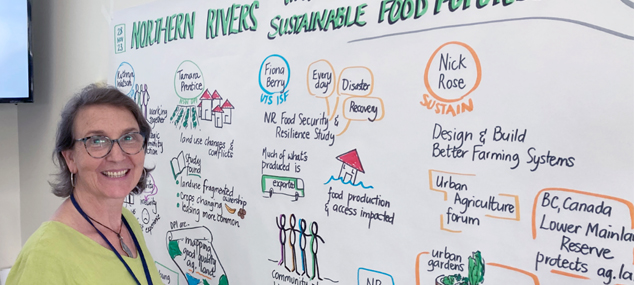
Members of the Northern Rivers community today joined representatives from government, universities and not for profit organisations to discuss the resilience of the local food system at the Urban Agriculture and Sustainable Food Futures Roundtable.
The event on Tuesday 28 November was co-hosted by Northern NSW Local Health District (NNSWLHD), Sustain: The Australian Food Network and the University of Technology Sydney’s (UTS) Institute for Sustainable Futures.
Participants discussed food security, emergency food relief, climate-friendly agriculture and the development of young farmers and community food enterprise in the Northern Rivers.
NNSWLHD Acting Director, Integrated Care and Allied Health, Kathryn Watson said urban agriculture is critical to creating local communities where people can access good quality local food to keep themselves and their families well.
“Healthy food and built environments are key components to support healthy eating and active living. It’s also a key priority for NSW Health, as part of the Healthy Eating and Active Living Strategy 2022-32,” Ms Watson said.
The roundtable was initiated in response to findings and recommendations of a joint study released in June this year by local community organisation Plan C and UTS.
Fiona Berry, Research Principal at the UTS Institute for Sustainable Futures, said there are increasing challenges for food security and nutrition.
“Natural disasters as a result of climate change, disruptions to the food supply chain from the COVID 19 pandemic, the increasing cost of living and housing, and population growth, are all challenges to our food security,” Ms Berry said.
“These global challenges can further compound an individual’s situation, depending on their home environment, income, distance to food outlets and knowledge of food preparation and nutrition.”
The 2023 Foodbank Hunger Report highlighted that during the last year, the cost of living crisis has affected food security, with three million households in Australia going from being food secure to food insecure.
For three out of four households, this was the first time they had experienced food insecurity.
Director of Sustain: the Australian Food Network, Nick Rose said the roundtable marked the beginning of the long term planning required for a resilient and sustainable regional food system.
“The plan will seek to enhance food security, address vulnerabilities in the system and provide affordable, healthy, accessible and culturally appropriate food for the community,” Mr Rose said.
“We are at an inflection point in 2023, with the climate emergency plus the cost-of-living crises making more and more communities, governments and organisations focus on what is real and important, starting with access to healthy and fresh food and food security for all.”
A report will be developed following the roundtable to continue NNSWLHD’s advocacy and collaboration on food sustainability in Northern NSW.